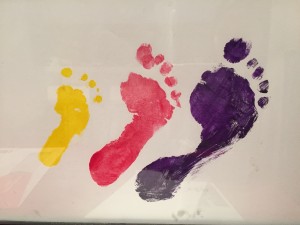Pregnancy takes a big toll on our bodies and can be quite uncomfortable for many women. Whilst some women have no trouble with their feet at all, many have pain and discomfort. Generally the pain resolves shortly after the baby arrives, but in some cases, the changes are long term. Here are a few issues you may have with your feet and some  ways to alleviate some of the discomfort:
ways to alleviate some of the discomfort:
Sore Heels/Arches: With the additional weight of your baby, fluid and the placenta, a lot of extra load is placed on the feet. This extra load, coupled with the relaxin hormone, released in pregnancy can result in the muscles and ligaments supporting the arch of the foot to stretch and reduce the arch height resulting in a flat foot. Flat feet or excessive pronation (rolling in) can result in foot, leg and hip pain
Treatment: To prevent pain, there are a number of things you can do
- Choose supportive footwear. This doesn’t mean you have to wear orthopaedic shoes, but wherever possible, forego the heels or ballet flats for a shoe that holds your heel firmly in place and supports the arch and foot.
- Massage your foot: Rolling your foot along a ball when you are sitting down or a specialised foot roller, can stimulate blood flow and drainage away from the feet and minimise discomfort
- Temporary arch supports/orthotics- if the pain is very bad, it may be necessary to wear an insert in your shoe during the pregnancy to help maintain the arch and minimise pain
- Visit your Podiatrist- 9 months is a long time to have sore feet….. if the pain is getting worse, a podiatrist can help to relieve the pain and get you moving during pregnancy
- Alter your exercise program to include more low impact or no impact exercise such as swimming
Shoe size changes: There are many reasons that a pregnant woman’s shoe size can increase- Swelling of the feet, the effects of relaxin, extra load- but it is important to ensure that you accommodate the larger foot to avoid painful skin changes (corns and calluses), ingrown toenails or toenail thickening.
Swelling: There are number of reasons that a pregnant woman’s feet may swell and these are best discussed with your obstetrician. They may suggest compression stockings and elevating the feet whenever possible.
Callous and Corns: For the reasons listed above (extra weight, swelling etc), the foot may fit differently into shoes and take more pressure during walking. As a result to protect underlying vessels and nerves, the body will create thicker skin in the areas at risk. This thickening of the skin may become painful and your podiatrist can remove this for you.
